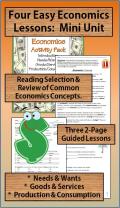Why was the Book of principles of Economics written?
"Principles of Economics" is a widely used introductory textbook written by N. Gregory Mankiw. The book was written with the primary purpose of providing students with a comprehensive and accessible introduction to the fundamental principles of economics. Here are the key origins and purposes behind the writing of "Principles of Economics":
Origins:
Teaching Experience:
- N. Gregory Mankiw, the author, is an economist and professor at Harvard University. The book draws on his extensive experience teaching introductory economics courses to undergraduate students.
Understanding Student Needs:
- Mankiw recognized the need for a textbook that would effectively communicate economic concepts to students who may be encountering the subject for the first time. The book was designed to be approachable and to make economics engaging for a broad audience.
Evolution of Economic Thought:
- "Principles of Economics" incorporates the evolving landscape of economic thought. It builds on classical economic principles while also introducing students to more modern perspectives.
Purposes:
Introduction to Economics:
- The primary purpose of the book is to introduce students to the core principles of economics. It covers both microeconomics (individual decision-making) and macroeconomics (aggregate economic phenomena) to provide a comprehensive overview.
Clarity and Accessibility:
- Mankiw aimed to present economic concepts in a clear and accessible manner. The book avoids unnecessary jargon and uses real-world examples to help students relate economic principles to their everyday lives.
Relevance and Application:
- "Principles of Economics" emphasizes the practical applications of economic theory. It demonstrates how economic principles can be used to analyze and understand various economic phenomena, policy issues, and decision-making.
Balanced Approach:
- The book takes a balanced approach to economic analysis, presenting multiple perspectives and schools of thought. It helps students understand that economic issues often involve trade-offs and considerations from different economic theories.
Engaging Pedagogy:
- Mankiw incorporates a variety of pedagogical tools to enhance learning, including case studies, graphs, charts, and real-world examples. The goal is to engage students and facilitate their understanding of complex economic concepts.
Integration of Modern Economics:
- The book incorporates insights from modern economics, behavioral economics, and recent developments in the field. This integration ensures that students are exposed to contemporary economic thinking.
Global Perspective:
- Recognizing the interconnectedness of the global economy, the book provides a global perspective on economic issues. It explores the implications of economic decisions and policies on a global scale.
Versatility:
- "Principles of Economics" is designed for a wide audience, including students majoring in economics and those studying the subject as part of a broader education. Its versatility makes it suitable for a range of educational settings.
In summary, "Principles of Economics" was written to serve as an effective and engaging resource for students studying economics at the introductory level. The book's origins lie in Mankiw's teaching experience and a recognition of the need for a modern, accessible, and comprehensive textbook that introduces students to the principles and applications of economics.
The Enduring Legacy of Principles of Economics: Unpacking its Purpose and Impact
N. Gregory Mankiw's "Principles of Economics" has become a behemoth in the realm of economic textbooks, shaping generations of students and economic understanding. Let's delve into its origins, contributions, objectives, contemporary relevance, and distinguishing features:
1. Motivations for its Creation:
Several factors drove Mankiw's vision for "Principles of Economics":
- Dissatisfaction with existing texts: He found existing textbooks overly technical and inaccessible to beginners.
- Gap in the market: He saw a need for a clear, concise, and engaging economics textbook for introductory courses.
- Passion for economic education: Mankiw wanted to make economics accessible and interesting to a broader audience.
2. Contribution to Economic Education:
"Principles of Economics" has made significant contributions:
- Demystifying economics: It simplifies complex economic concepts using approachable language and real-world examples.
- Engaging students: Interactive features, humorous anecdotes, and relevant current events keep students engaged.
- Widespread adoption: Its popularity in classrooms makes it a common reference point for economic discourse.
- Inspiring future economists: Its clarity and accessibility have sparked interest in economics among many students.
3. Key Objectives and Goals:
The book pursues these key objectives:
- Providing a fundamental understanding of economic principles: It covers core concepts like scarcity, supply and demand, market structures, and government intervention.
- Developing critical thinking skills: It encourages students to analyze economic issues and debate policy options.
- Connecting economics to real-world issues: It showcases how economic concepts apply to everyday life and current events.
- Making economics relevant and interesting: It avoids excessive technical jargon and uses relatable examples to keep students engaged.
4. Addressing Contemporary Economic Issues:
"Principles of Economics" remains relevant by:
- Regularly updating editions: New editions incorporate recent economic developments and address current economic debates.
- Providing online resources: Interactive exercises, study guides, and news updates keep students current with emerging trends.
- Emphasizing the dynamism of the economy: It highlights that economic principles evolve and need to be applied contextually.
5. Distinguishing Features:
Several aspects set "Principles of Economics" apart:
- Clarity and conciseness: It presents complex concepts in a simple and understandable way, avoiding unnecessary jargon.
- Engaging writing style: It uses wit, humor, and real-world examples to make learning economics enjoyable.
- Focus on policy implications: It explores the practical applications of economic principles to policy decisions.
- Neutral political stance: It presents various economic viewpoints without advocating for any specific ideology.
- Wide range of learning resources: It offers online tools, quizzes, and additional materials to supplement student learning.
In conclusion, "Principles of Economics" has not only revolutionized economic education but also provided a valuable resource for anyone interested in understanding the workings of the economy. Its clear explanations, engaging writing, and constant updates ensure its continued relevance in the ever-evolving world of economics.
Whether you're a student, a curious individual, or a seasoned scholar, "Principles of Economics" offers a valuable gateway to unlocking the intricate and impactful world of economic principles.












